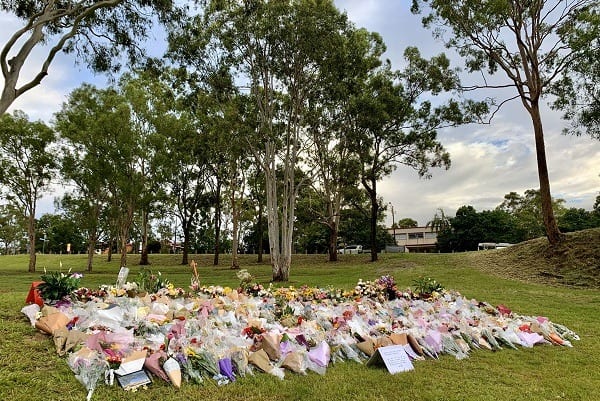It’s been six months since Hannah Clarke and her three children, Aaliyah, Laianah and Trey were brutally and violently murdered in suburban Brisbane.
On February 19, Hannah Clarke’s estranged husband doused Hannah and her children in petrol before setting them alight when they were in the car on their way to school.
The extremely violent circumstances of their killings, and the details of the coercive control tactics that Hannah had been subjected to by her abuser, have been etched in the minds of many Australians since that day.
Hannah’s parents have since spoken about their daughter’s bravery, reminding us that on the day she and her children were killed, she still managed to give descriptions about what had happened to first responders.
“On the scene, she walked herself to the stretcher, put herself down and gave the description of what the monster had done,” Lloyd Clarke said. “She passed out going to the hospital and then when she came to in ICU, gave it all again.
“It was just so strong and obviously, she wanted this monster to be caught. At that time, she didn’t know that he had passed.”
In the wake of Hannah, Aaliyah, Laianah and Trey’s murders, the family has established a non-profit foundation, Small Steps for Hannah, to help halt the cycle of domestic abuse and raise awareness. They would also like to see coercive control, a system of psychological abuse and controlling behaviours designed to strip someone of their sense of autonomy and self-worth, prohibited by law in Queensland.
Coercive control has already been criminalised in countries like England, Wales, Scotland and Ireland.
But as has been reported by Nine papers this week, no new domestic violence legislation has been introduced by the Queensland state government since Clarke’s murder six months ago.
In May, a Senate Committee that had been established to conduct an inquiry into domestic violence wrapped up three months ahead of schedule, without seeking a single submission or holding a hearing. As Georgie Dent wrote at the time, it is hard to imagine a more insulting and inadequate response to a national crisis.
We know that on average, one woman is violently killed every week in Australia and according to Counting Dead Women Australia researchers of Destroy The Joint, 34 women have been killed as a result of gender-based violence in 2020. The COVID-19 pandemic has only exacerbated the already existing emergency of domestic and family violence in Australia.
Natasha Stott Despoja, Chair of Our Watch and Australia’s candidate for the Committee on the Elimination of Discrimination Against Women, delivered a National Press Club address on the emergency of domestic and family violence on Wednesday. She said frontline workers are calling for more government support to deal with the domestic violence crisis and that a gender lens for the pandemic response is urgently needed.
Speaking to ABC’s AM program with Sabra Lane, Stott Despoja said we are dealing with what UN Women have described as a ‘shadow pandemic’.
“That is, the issue of increased violence, both in terms of amount and severity, against women and children. Largely as a consequence of some of the measures that we use to curtail the spread of the pandemic, and that includes lockdown and people being trapped in homes, potentially with their abusers full-time,” she said.
Stott Despoja said criminalising coercive control would be a positive step towards keeping women and children safe, but a whole of community approach is also needed.
“We’ve worked out the best way to stop this violence, of course, is to do it before it starts. But that actually takes time, it takes a whole of population, community approach.”
“Not only do you need changes from governments, whether that’s in relation to issues such as coercive control which I know is being discussed as a consequence of the Hannah Clarke murders.
“You need individuals to make changes. Corporates and businesses need to look at their policies. We need to be good and better bystanders as individuals when it comes to calling out behaviour that is inappropriate – be that coercive control or whether it’s sexist jokes or workplace harassment.”
If you or someone you know is in need of help due to family and domestic violence contact 1800RESPECT on 1800 737 732.
In an emergency call 000.


